As relations between Azerbaijan and Russia continue to deteriorate, recent statements and diplomatic activity suggest both sides are navigating a growing crisis with potential regional implications.
In a recent interview with RBC, the head of Rossotrudnichestvo, Yevgeny Primakov, commented on the apparent lack of support from ethnic Russians living in Azerbaijan toward Moscow amid the tensions. He claimed that many in the Russian community felt compelled to remain neutral or support Azerbaijan because they hold Azerbaijani citizenship.
“Their position is understandable — they hold Azerbaijani passports,” Primakov said.
“Still, we would like to see a clearer sense of loyalty and emotional connection to the motherland. Russia deserves respect from its compatriots abroad, even if they remain loyal to their countries of residence.”Stay Ahead with Azerbaijan.usGet exclusive translations, top stories, and analysis — straight to your inbox.
Primakov’s remarks came during the visit of Russian Emergencies Minister Aleksandr Kurenkov to Baku. Officially, Kurenkov was there to participate in the 58th Executive Council meeting of the International Civil Defense Organization, currently chaired by Russia. However, sources cited by JamNews and pro-government Russian Telegram channels suggest his true mission was more discreet: informal talks to ease the spiraling tension between Moscow and Baku.
Background: The Crisis Unfolds
The diplomatic fallout began to escalate following the deaths of two Azerbaijani brothers, Huseyn and Ziyaddin Safarov, during a police operation in Yekaterinburg on June 27. Azerbaijani authorities claim the brothers were killed by blunt force trauma, directly challenging Russia’s official version, which cited cardiac arrest.
In response, Azerbaijan’s Foreign Ministry demanded a full investigation, and tensions deepened when Azerbaijani security services raided the Baku office of Sputnik Azerbaijan, arresting two employees accused of working with Russian intelligence services. Their appeal to change the terms of detention was rejected by a Baku court on July 7, as reported by APA.
Further complicating matters, Azerbaijani authorities have detained eight Russian citizens on charges ranging from drug trafficking to cybercrime. In what observers call tit-for-tat diplomacy, ethnic Azerbaijanis living in Russia have reported increased targeting by Russian security agencies, while Russian nationals in Azerbaijan — including tourists — have faced unexpected visits from local law enforcement and been asked to report to migration offices.
Behind Closed Doors: A Search for De-escalation
The Kremlin appears to be searching for a diplomatic off-ramp. Russian Telegram channel VChK-OGPU, citing inside sources, reported that an offer of a “prisoner swap” may have been floated during Kurenkov’s trip — exchanging detained Russian citizens in Azerbaijan for those arrested in Russia. While this remains unconfirmed, it reflects the severity of the current diplomatic rift.
Meanwhile, Azerbaijan has leveraged its strategic position to support Russia in other contexts. During the recent flare-up between Iran and Israel, Baku facilitated the evacuation of Russian citizens from Iran through the Astara border crossing. Those evacuated included artists, scientists, and oil workers, as well as members of film director Fyodor Bondarchuk’s crew and musicians from the Tchaikovsky Symphony Orchestra.
Long-Simmering Tensions Resurface
The breakdown in trust between the two countries has been months in the making. One flashpoint was the December 25, 2024 crash of an Azerbaijan Airlines flight traveling from Baku to Grozny, which killed all 67 on board.
More recently, tensions escalated when Russian authorities stripped Elshan Ibrahimov — head of the Azerbaijani national-cultural autonomy in Moscow region — of his Russian citizenship. Though officially unconnected to the crisis, many saw it as part of a broader retaliatory pattern.
Strategic Risks Loom
Analysts warn that the standoff threatens broader strategic cooperation, including plans for the North–South Transport Corridor and energy transfers to Iran. The risk of a prolonged standoff could undermine Moscow’s influence in the South Caucasus and shift Baku further into alternative geopolitical partnerships.
For now, diplomacy remains the only path forward — but with arrests, accusations, and unresolved deaths fueling public anger on both sides, the road to normalization appears increasingly steep.


